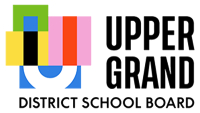All staff at the Upper Grand District School Board have a responsibility to align their work with Canadian copyright legislation and fair dealing guidelines. This applies to both traditional and digital mediums, including books, blog posts, teacher websites, online images, films and movies, and more.
Under the Canadian Copyright Act, copyright applies to "original literary, dramatic, musical and artistic works that are in a fixed material form (i.e., written, recorded)."
Many, if not most, of the resources we use on a day-to-day basis are protected by copyright. Some clues that a resource may be copyrighted are if you see the copyright symbol - a small letter 'c' enclosed in a circle - or a copyright or creator statement. When in doubt, assume that a resource is protected by copyright, and act accordingly.
There are many purposes to copyright:
It requires us to acknowledge who created the original content we're interested in copying, which celebrates the contributions they've made to the knowledge landscape.
It also protects creators' intellectual property by making it more difficult for people to steal or pass off other creators' works as their own.
And finally, copyright ensures that creators receive compensation when their work is used.
Within the Canadian Copyright Act is a provision called fair dealing that permits use of a copyright-protected work without permission from the copyright owner or the payment of royalties. In order for fair dealing to apply, however, two tests have to be passed.
The first test is the purpose of the use - fair dealing only applies if the work is going to be used for research, private study, criticism, review, news reporting, education, satire, or parody. If a work is being used for educational purposes, then it passes the first test.
The second test is the fairness of the use. Determining whether or not the use is fair requires us to consider how much of the original work is used; if it is copied, how many copies are made; how widely reproductions are distributed or made available; whether alternatives to the work are available; and what the impact of the use will be on the original work.
Note: Consumable resources - materials intended for one-time use such as workbooks and exercise sheets in which a student records answers - are not eligible for reuse under fair dealing. If permission is not provided or you did not create it yourself, reproducing a consumable resource is strictly prohibited under the law and is penalized as copyright infringement.
TJRC staff can provide UGDSB employees with guidance regarding copyright questions and public performance rights. Contact Lauren Bull, Supervisor of Library and Media Services, to learn more.
Resources:
Copyright Matters! 5th Edition - Key Questions & Answers for Teachers - Provides helpful direction around using copyrighted materials at school. Easily navigate the PDF by pressing the F key while holding the Ctrl key - this will open up an option to search the document.

